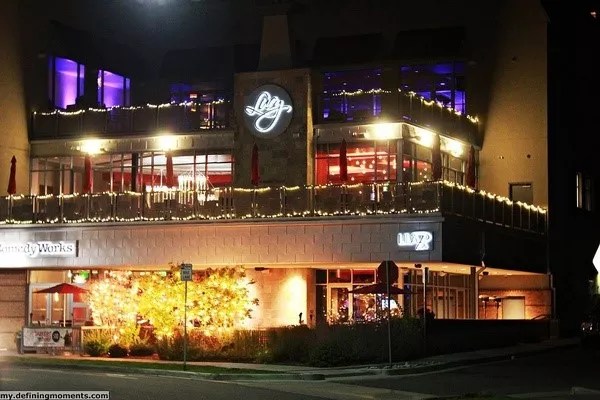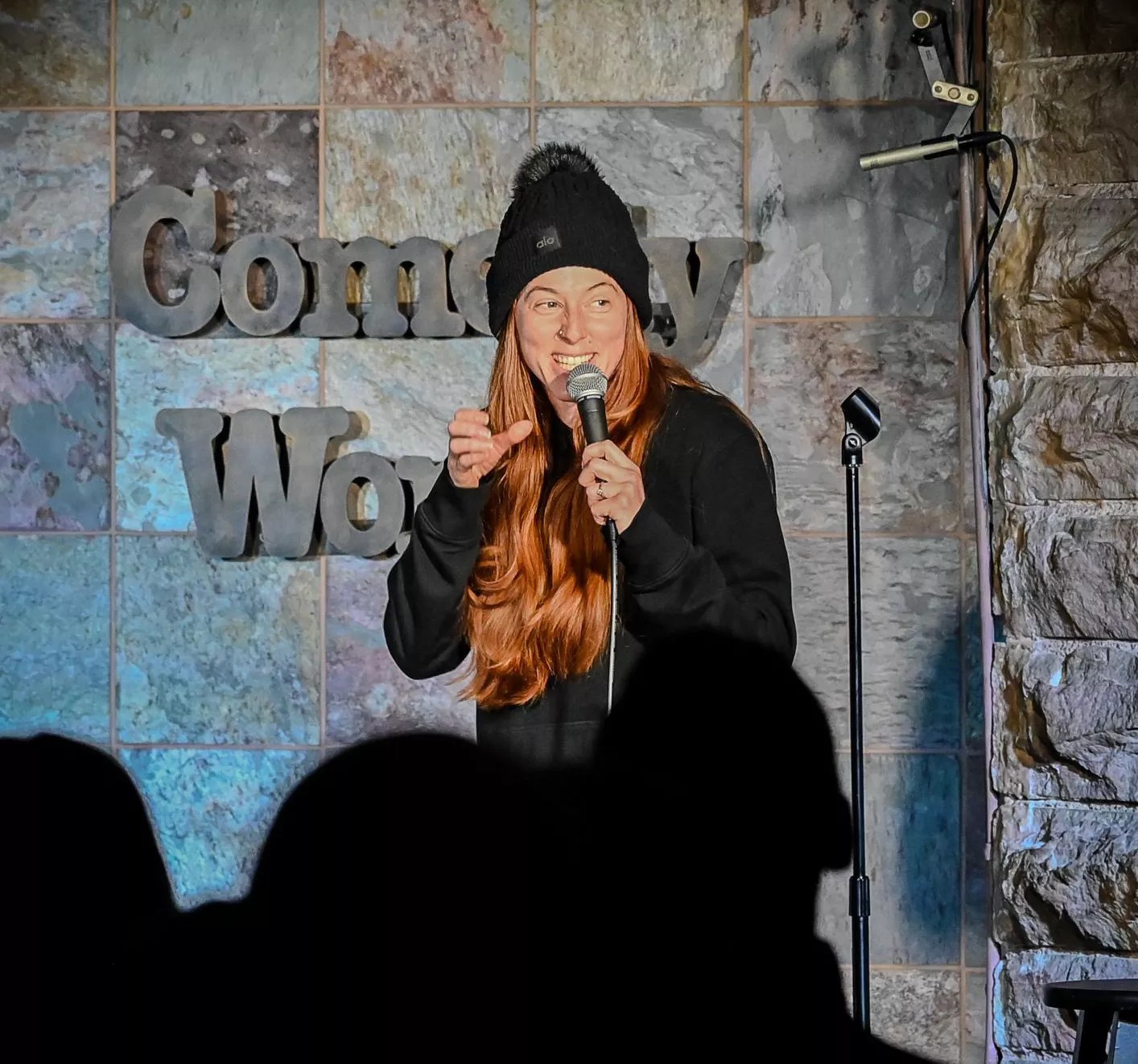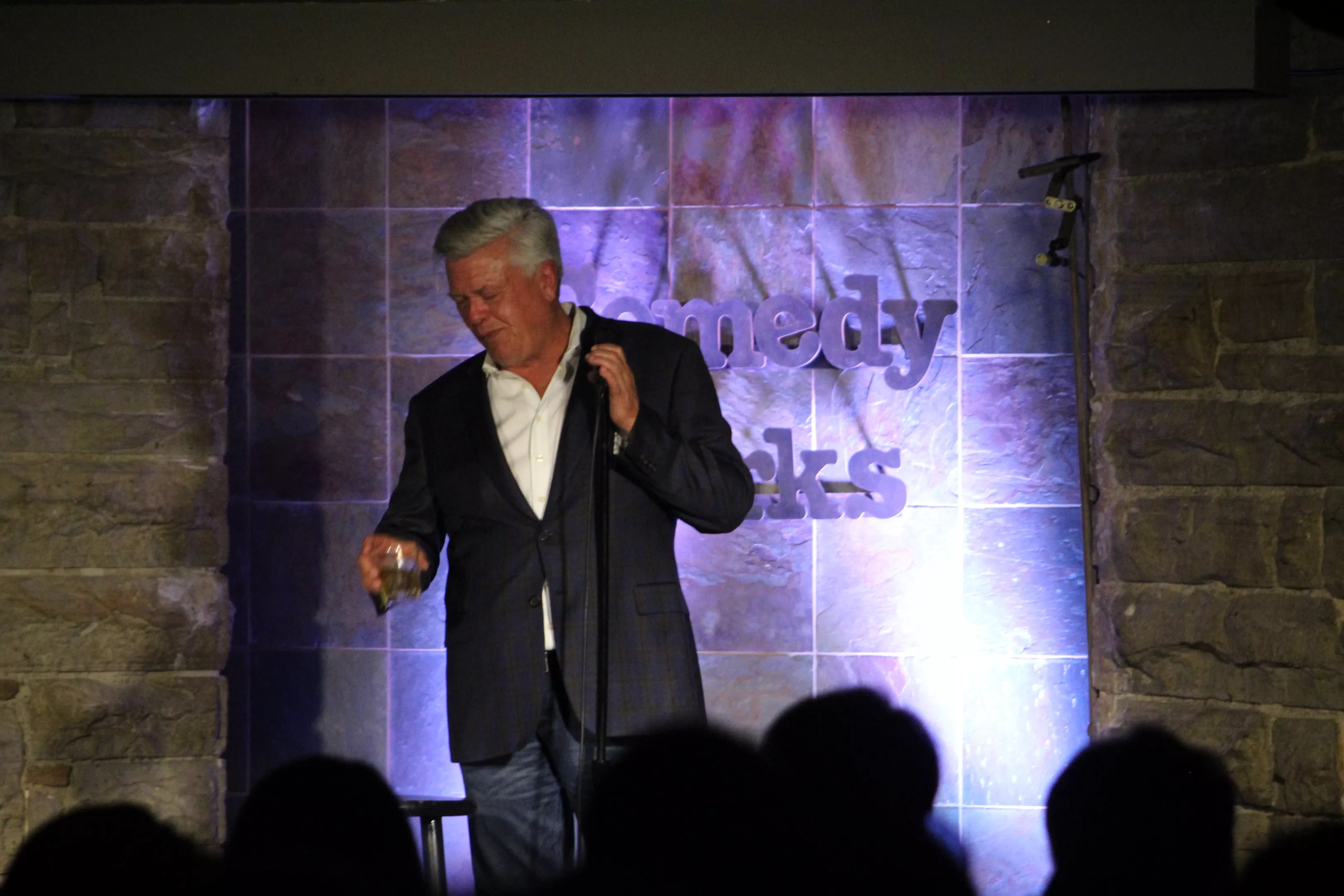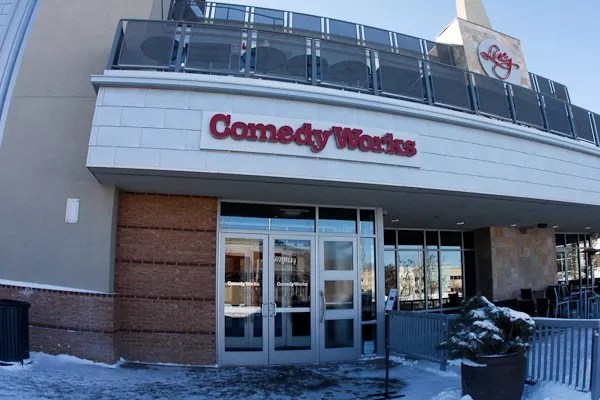
Courtesy of Comedy Works

Audio By Carbonatix
Comedy Works has been a comedy hub ever since Edd Nichols, Doug Olson and comedian George McKelvey opened its downtown location in 1981. The historic club opened as the Comedy Shoppe before quickly changing to its well-known moniker the same year it opened.
Comedy Works has hosted an array of comedy royalty, including the likes of Jerry Seinfeld, Jay Leno and Ellen DeGeneres, establishing itself as a pivotal stage in the careers of standup legends and expanding its operation in 2008 with its South location. At the helm of this comedic institution is Wende Curtis, who, after more than two decades of ownership and 37 years of association with Comedy Works, has guided the venue through highs and lows.
“We think everybody who’s anybody has played here at some point,” Curtis says. “Comedy Works has reached a point where, when somebody pitches us, it’s either somebody that I don’t know or they’re huge.”
Curtis began working for Comedy Works in December 1986 as a cocktail waitress at the club’s now-defunct Fort Collins location during her senior year at Colorado State University. After graduating in 1987, she continued to work at the club and took on more responsibilities, such as managing and booking for the Fort Collins and Denver locations.
Originally from Garden City, Kansas, she moved with her family to Aurora in 1974, when she was eleven. Curtis’s father opened an auto parts store on Brighton Boulevard, and she assisted him by counting inventory and cleaning the family business. She attended Hinkley High School, where she performed in musicals, and planned to attend acting school after graduating from CSU. However, due to her ongoing battle with eating disorders, she remained in Colorado at Comedy Works, where she found solace and focused on her mental health.
“I never thought that I would be here,” Curtis says. “I am so grateful that I was able to do this. I’ve never had a professional résumé, so thank God this gig worked out. I think it’s because I’m pretty stubborn and I don’t quit.”

Wende Curtis went from cocktail waitress to owner of Comedy Works.
Comedy Works
Curtis stepped onto the scene when comedy was on the cusp of a boom. The mainstays of the state’s comedy circuit included Comedy Works, as well as the other clubs McKelvey founded after he decided to go out on his own, including George McKelvey’s Comedy Club in Aurora, Wit’s End in Westminster and comedy nights hosted at his music clubs one night a week in Denver, Aurora, Boulder and Fort Collins.
The format was “much simpler then,” Curtis notes. “A year after I’d been with Comedy Works, I started doing the booking, and every week was the same: Wednesday through Sunday in both clubs in Fort Collins and Denver; it was five nights and seven shows. In Denver, we brought in a headliner, and in Fort Collins, we brought in a headliner, a feature act and an opening act, and they did all seven shows. It was like that every week for a good chunk of years.”
This booking style meant that such big names as Jeff Foxworthy, Rob Becker and George Carlin all played for a week at the venues. Not as many acts needed to be booked, “and it was crazy cheap,” Curtis recalls. “There just weren’t a lot of big names; it wasn’t as big of an industry back then. There have been lots of different phases in Denver’s comedy scene, and this phase is a boom.”
Owners Nichols and Olson sold Comedy Works to First Entertainment Inc. in 1990. Eleven years later, Curtis, Olson and another partner purchased the club, and by 2002, Curtis had bought out both partners to become the sole owner. Throughout her tenure, Curtis has guided Comedy Works through the industry’s various stages of growth. And she’s seen some great comedy along the way.
“Oh, my God, there have been so many incredible comedians who have played Comedy Works over the years,” Curtis says. “I was a huge Greg Giraldo fan, God rest his soul – so him, for sure. When I was looking back at the list of comedians who have played Comedy Works, it starts off strong with the A’s.”
Curtis eagerly rattles off the names in rapid succession: Ali Wong, Ari Shaffir, Amy Schumer, Andrew Schulz, Anthony Jeselnik, Arsenio Hall and Aziz Ansari. “And those are just a few from the first letter in the alphabet,” she quips. “Then there’s the people that are close to my heart for so many reasons, like George Lopez, Dave Chappelle and Joe Rogan; they all came when they didn’t sell tickets. The late-night people, like Jimmy Fallon, who was one of our grand-opening acts at the South club, and legends like Bob Saget, who is a great B. Who are some other B’s? Oh, Bert Kreischer and Bobcat Goldthwait, of course. I can go on like this with the whole alphabet.”
Even though Curtis does not consider herself to be biased toward gender, “When I started thinking about my own favorites, they are a handful of girls like Michelle Wolf, Wanda Sykes and Ali Wong,” she says. “Maybe I am partial to women?”

Georgia Comstock performs regular sets as well as her new show, Catfish Comedy, at Comedy Works
Courtesy of @spawologyproductions
The recent comedy craze, which Curtis attributes to the pandemic, has introduced a slew of acts that connect with audiences via social media, podcasts and streaming specials. With all of these new national and local comedians, Comedy Works’ reach and repertory have increased significantly.
“We’re selling more tickets than ever before,” Curtis says, adding that “2019 was a banner year, and we had almost a whole quarter of 2020 that looked super fat and healthy. We closed for COVID for a bit, but since then, it’s been better and healthier.”
Curtis’s involvement in booking began a year after joining Comedy Works, allowing her to witness the dedication and growth of comedians who would go on to become household names. She highlights the close bonds and respect that have been pillars of the Comedy Works philosophy by sharing touching tales of her encounters with renowned comedians.
“There are so many amazing memories at so many different levels,” Curtis says. “I have started writing a book, a kind of memoir, with all my behind-the-scenes stories. An agent talked me into it a few years ago. I kept saying I was going to do it, but there was always an excuse not to, but I finally said, ‘No, it’s 2024; I’m doing it.’ So I’ve started writing stories. I remember sitting on the back steps with Ari Shaffir during the summer. He was working as a doorman at the Comedy Store, like so many other comics in L.A., and we talked about how much he wanted it, and look at him now.”
She recalls running into George Lopez in Montreal in the early 2000s, at the height of his TV show. After Lopez introduced Curtis to his wife, he told her something that would stay with her for years.
“He said, ‘Comedy Works is the greatest club – she has the greatest club ever.’ And I immediately joke that, if he’s ever slumming it again, he should come to the club,” Curtis says. “It was just one of those things I threw out there because I had nothing to lose, but I’ll be damned, he said yes and was there the following July and November. That man has always kept his word and helped me financially when I was in trouble. That man is an incredible human, as so many of these people are.”

Ron White performing at Comedy Works Downtown.
Courtesy of Comedy Works
Although people always ask her if she’s had any negative interactions with comedians, Curtis says she has “so few memories of anything like that.” Most of her experiences with the artists were positive, such as the last time she saw Bob Saget before his death.
“It was on a Friday night,” she recalls. “He died in January 2022 and had been at the South club in November. I went into the green room before the opening acts had started and we talked for a while. I met his new wife for the first time; I’d been out of town before, so I didn’t get a chance to meet her. Before he goes on stage, he says, ‘I love you. Am I going to see you tomorrow?’ And I said, ‘I have to be Downtown, so maybe, but I don’t think so.’ And he said, ‘I love you,’ and that was the last time I saw him. That man told people that he loved them, and that made a huge impression on me.”
Another fond memory she has is backstage at Fiddler’s Green with Dave Chappelle. “It’s kind of dark, and there are all these people everywhere wanting a piece of him,” Curtis says. “But when he sees me, he goes, ‘Hey, Wende!’ It really took me aback that he knew me in that crowd anyway. And guess what? I think I got a date out of that. I always got dates out of those things.”
When Chappelle came to Denver in 2016, it even led to a massive operational change at Comedy Works. Curtis had cut a deal with his management team on a late night over the weekend for his sets in both clubs from a Monday through Thursday.
“His agent is telling me about this thing that we’re going to have to do, but not to worry about it, because the expense will come off the top,” she says. “They said, ‘They’re going to bring it there for you,’ but again, it’s the middle of the night, and I don’t know what the hell he’s talking about, but it sounded like they’re going to put something in the showroom that kills the signals on cell phones. He was actually talking about Yondr, which are these little packages that we would use to lock up phones when people came in and give them back when they left. It was a game-changer.”
Tickets for the show weren’t cheap, so Curtis was unsure how people would respond to these last-minute changes. Normally, shows with big names tend to get crazy, but this one did not. By the time the late show arrived and people were behaving, she knew she needed to use Yondr in both clubs.
“Because no one could even have their phone in their bag to check the time, there was never a light going off, and there were no distractions,” Curtis observes. “We didn’t have to watch for texting anymore, and, most important, they were attentive; they weren’t chatty. … They only left enough for one club, but I purchased the system for all of Comedy Works after that.”

Courtesy of Eric Gruneisen
The Yondr system has transformed the live comedy experience, ensuring undivided attention while maintaining the purity of the performance. Curtis’s journey with Comedy Works, from waiting tables to becoming the owner and driving force behind one of the country’s premier comedy clubs, mirrors the evolution of standup comedy itself. Her determination, coupled with a mission to be the best, has solidified Comedy Works’ status as a cherished institution.
“Never in a million years did I imagine this,” Curtis says. “I loved the business when I was waiting tables and trying to finish my degree – I just wanted to be the best, and we rose through the ranks. When we were building the South club, I had an attorney and his interns or something put together a mission statement, and they turned in this long thing, and I didn’t even know what the hell it said.
“I said, ‘No. Our mission statement is to be the best comedy club in the country. Period.’ That’s what I want,” she concludes. “It wasn’t an ego thing; I just wanted Comedy Works to be the best, and it wasn’t hard.”
Read more about Comedy Works and upcoming shows at comedyworks.com.